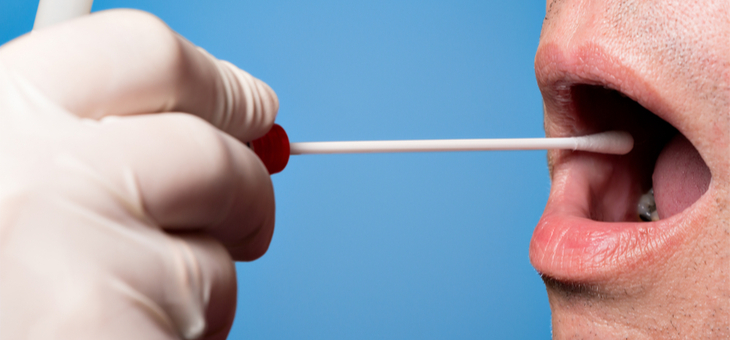Australian scientists have developed a 15-minute COVID-19 test that could help open the nation’s internal borders.
University of Technology Sydney researchers say the sensitive saliva test rapidly recognises SARS-CoV-2 viral fragments. Rapid testing could enable travel between states, saving jobs in tourism and hospitality and stimulating the economy. It would also be useful in hospitals, aged care and workplaces.
“A person with COVID-19 may be contagious 72 hours before starting to show symptoms,” said UTS’s Dr Dayong Jin in a statement. “With the sensitivity of our optical technology, we aim to identify the viral protein in saliva from asymptomatic but already infectious patients.
“This would allow for much more effective contact tracing and rapid discovery of pockets of disease before it is transmitted to others.”
AAP reports that laboratory trials are expected to begin before Christmas and tests would costs as little as $25.
On Monday morning, NSW Premier Gladys Berejiklian said she would wait at least two weeks after Victoria substantially eased coronavirus restrictions before opening her state’s border with Victoria.
On Tuesday, just one new case of coronavirus was confirmed in Victoria, and Melbourne’s 14-day average fell to 6.4. There have been fewer than 10 new cases for five days.
Restrictions are due to be further eased in Melbourne on 2 November, when hospitality and retail will reopen and limited home visits will be allowed, but Victorian Tourism Industry Council chief executive Felicia Mariani has pleaded for a date or criteria for relaxing travel restrictions.
Victorian Premier Daniel Andrews hoped NSW and South Australia would reopen to regional Victoria this week.
Tasmania reopens to travellers from NSW on 2 November, but is shut to Victorians until December.
Some regional Victorian workplaces have already started using saliva tests for COVID-19 following a successful trial involving 1000 police officers in Bendigo.
Asymptomatic testing was set up across industries, including meat processing and refrigerated distribution centres, from Monday. The trial was the result of a joint venture between the Peter Doherty Institute for Infection and Immunity (Doherty Institute), the University of Melbourne, the Royal Melbourne Hospital and the Victorian government.
Doherty Institute deputy director Dr Mike Catton said while the nasal swab remained the ‘gold standard’ of COVID-19 testing, saliva testing could be an “excellent alternative in some settings”.
A saliva test study involving 1200 volunteers at the University of South Carolina produced encouraging results.
“Even if the tests are not as sensitive as swabs, the sheer number and repetition makes it possible to catch an infection that may have been missed the day before,” wrote Amanda Hedit for The Scientist.
The trial proved that saliva testing required fewer supplies, and people were more likely to undergo repeated tests if they only need to spit into a cup.
“I think that the saliva detection is actually more representative of who is infectious,” said Carolyn Banister, a pharmacologist at the University of South Carolina.
The British government is also developing a 15-minute saliva test, which the English Premier League hopes will enable crowds to return to football matches by March.
The Telegraph has reported that the company hired by the Premier League to screen players has developed mobile testing centres to ‘turbocharge’ the process for spectators as soon as the new tests become widely available.
Prime Minister Boris Johnson announced on Friday that the country was developing the capacity to manufacture millions of fast turnaround tests to provide ‘Freedom Passes’ for citizens attending events.
“To get Britain back to work and play, we need an integrated strategy where mass testing converges with clinical health passports that are linked with the government’s track and trace system,” he said.
Meanwhile, The Age is reporting that the Victorian government is considering using GPS-enabled electronic tracking devices for some international travellers to make sure they isolate after their arrival. This would lessen reliance on the controversial hotel quarantine system.
Singapore, Hong Kong and South Korea have allowed returned travellers to isolate at home using an electronic wristband rather than in a government-appointed facility.
An attempt to leave home or tamper with the device triggers an alert to authorities.
The idea has the backing of RMIT University criminologist Marietta Martinovic, who has done a PhD on electronic monitoring.
“The whole world is in the middle of a pandemic. We have to be creative and the sooner we become creative, the better,” Dr Martinovic said.
“I’ve been studying the technology for 20 years and it’s become very reliable. We put people who are violent sex offenders on the technology … if it’s safe enough to be used for criminals, why on earth would it not be for returned travellers?”
Liberty Victoria president Julian Burnside also supported electronic monitoring.
“I don’t like the idea that people can be spied on that way all the time, but if that infringement of their ordinary liberties is designed to help save us all from a general threat like COVID-19, that is supportable,” Mr Burnside said.
“But it would have to be designed and implemented in a way that was plainly calculated to confine itself to coronavirus, and it would have to be removed as soon as (the quarantine) has passed.”
Will you travel as soon as you can? When should Australia’s internal borders open?
If you enjoy our content, don’t keep it to yourself. Share our free eNews with your friends and encourage them to sign up.
Related articles:
https://www.yourlifechoices.com.au/health/covid19/australia-boosted-on-asia-power-index
https://www.yourlifechoices.com.au/insights/podcast/podcast-how-the-travel-industry-is-fighting-back
https://www.yourlifechoices.com.au/travel/travel-qanda/top-10-coronavirus-questions

